
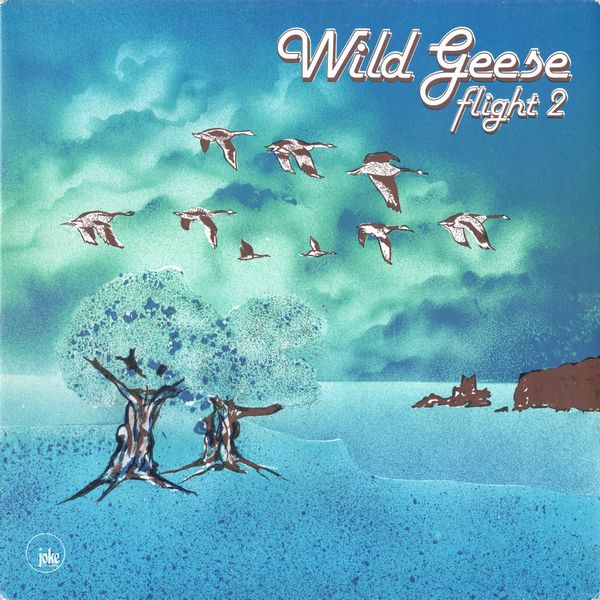 |
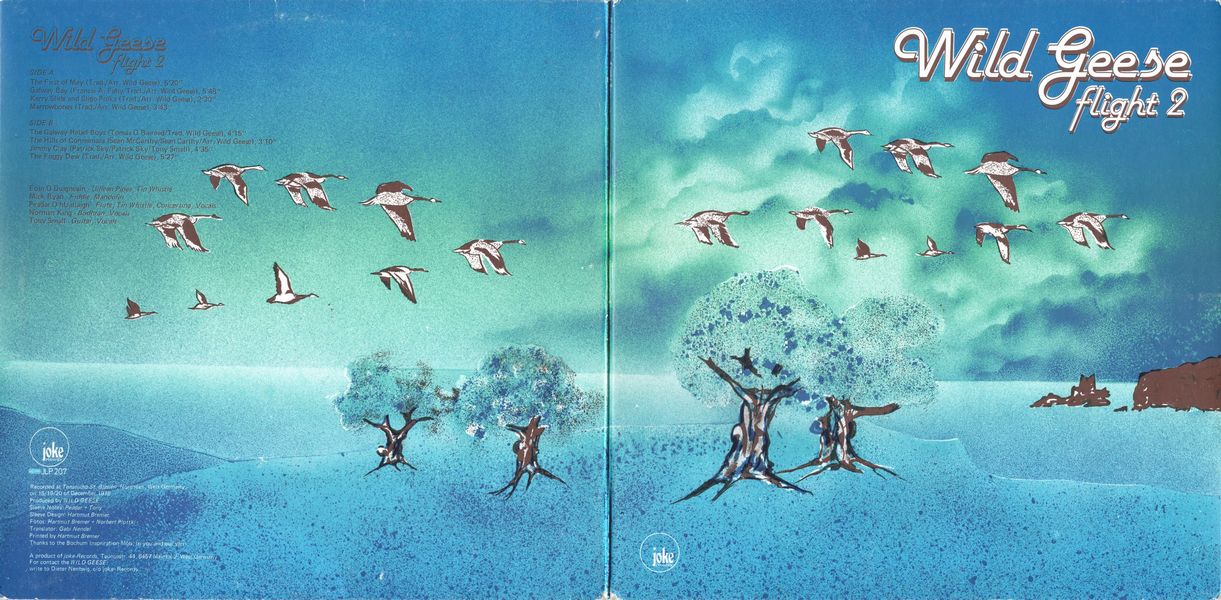
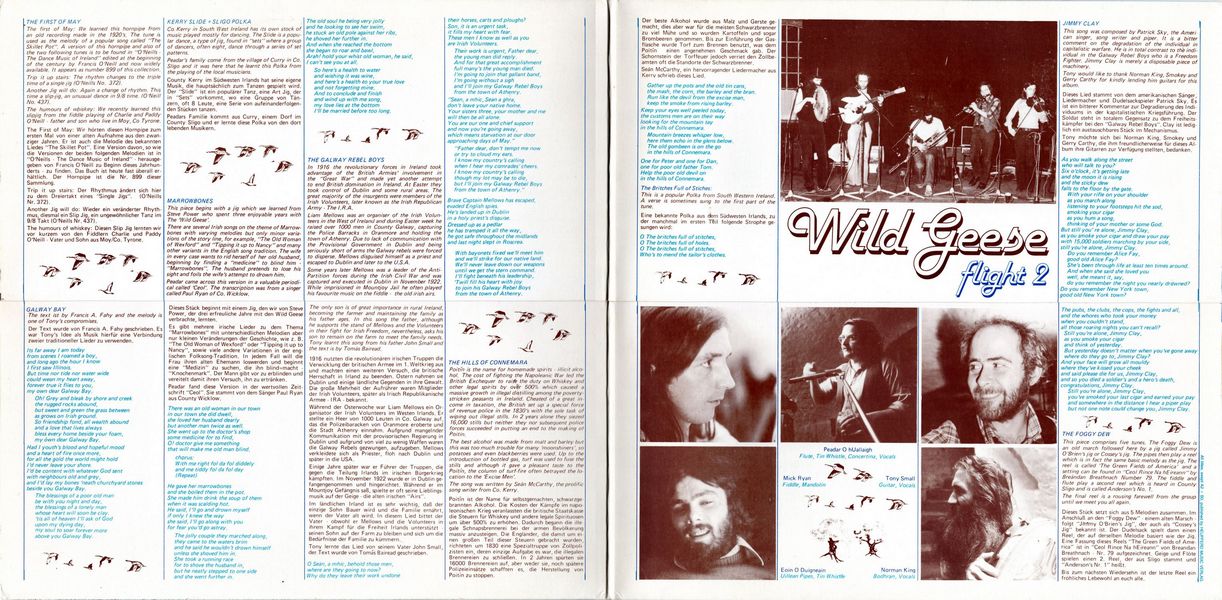
|
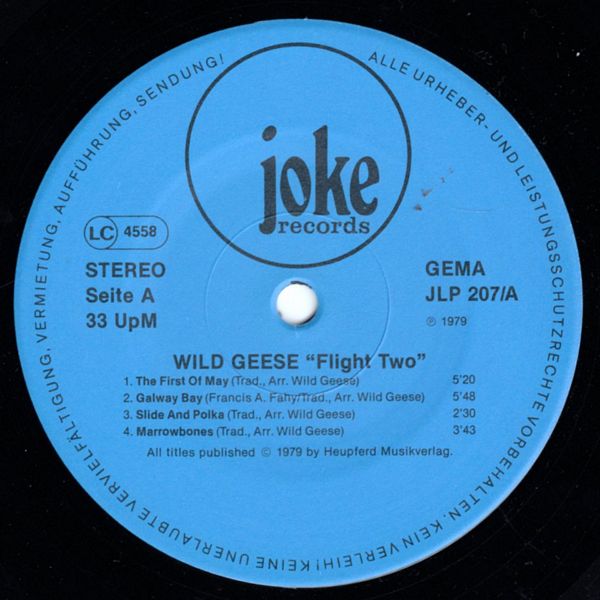
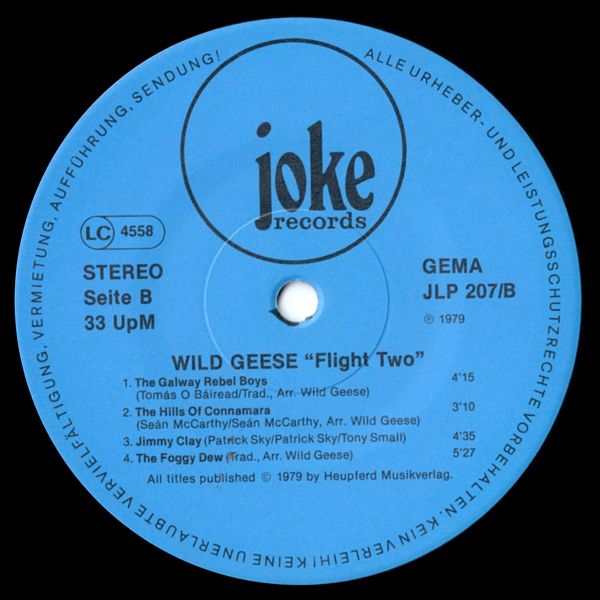
|
Sleeve Notes
THE FIRST OF MAY — The first of May: We learned this hornpipe from an old recording made in the 1920's. The tune is used as the melody of a popular song called "The Skillet Pot". A version of this hornpipe and also of the two following tunes is to be found in "O'Neills -The Dance Music of Ireland" edited at the beginning of the century by Francis O'Neill and now widely available. It appears as number 899 of this collection.
Trip it Up Stairs: The rhythm changes to the triple time of a single jig (O'Neills No. 372).
Another Jig Will Do: Again a change of rhythm. This time a slip-jig, an unusual dance in 9/8 time. (O'Neills No. 437).
The Humours of Whiskey: We recently learned this slipjig from the fiddle playing of Charlie and Paddy O'Neill - father and son who live in Moy, Co Tyrone.
GALWAY BAY — The text is by Francis A. Fahy and the melody is one of Tony's compromises.
KERRY SLIDE & SLIGO POLKA — Co. Kerry in South West Ireland has its own stock of music played mostly for dancing. The Slide is a popular dance, a type of jig, found in "sets" where a group of dancers, often eight, dance through a series of set patterns.
Peadar's family come from the village of Curry in Co. Sligo and it was here that he learnt this Polka from the playing of the local musicians.
MARROWBONES — This piece begins with a jig which we learned from Steve Power who spent three enjoyable years with The 'Wild Geese'.
There are several Irish songs on the theme of Marrowbones with varying melodies but only minor variations of the story line, for example, "The Old Woman of Wexford" and "Tipping it up to Nancy" and many other variants in the English song tradition. The wife in every case wants to rid herself of her old husband, beginning by finding a "medicine" to blind him — "Marrowbones". The husband pretends to lose his sight and foils the wife's attempt to drown him. Peadar came across this version in a valuable periodical called 'Ceol'. The transcription was from a singer called Paul Ryan of Co. Wicklow.
THE GALWAY REBEL BOYS — In 1916 the revolutionary forces in Ireland took advantage of the British Armies' involvement in the "Great War" and made yet another attempt to end British domination in Ireland. At Easter they took control of Dublin and some rural areas. The great majority of the insurgents were members of the Irish Volunteers, later known as the Irish Republican Army — The I.R.A.
Liam Mellows was an organiser of the Irish Volunteers in the West of Ireland and during Easter week he raised over 1000 men in County Galway, capturing the Police Barracks in Oranmore and holding the town of Athenry. Due to lack of communication with the Provisional Government in Dublin and being seriously short of arms the Galway rebels were forced to disperse. Mellows disguised himself as a priest and escaped to Dublin and later to the U.S.A.
Some years later Mellows was a leader of the Anti-Partition forces during the Irish Civil War and was captured and executed in Dublin in November 1922. While imprisoned in Mountjoy Jail he often played his favourite music on the fiddle - the old Irish airs.
The only son is of great importance in rural Ireland, becoming the farmer and maintaining the family as his father ages. In this song the father, although he supports the stand of Mellows and the Volunteers in their fight for Irish Freedom, nevertheless, asks his son to remain on the farm to meet the family needs. Tony learnt this song from his father John Small and the text is by Tomas Bairead.
THE HILLS OF CONNEMARA — Poitín is the name for homemade spirits - illicit alcohol. The cost of fighting the Napoleanic War led the British Exchequer to raise the duty on Whiskey and other legal spirits by over 500% which caused a massive growth in illegal distilling among the poverty-stricken peasants in Ireland. Cheated of a great income in taxation, the British set up a special force of revenue police in the 1830's with the sole task of wiping out illegal stills. In 2 years alone they siezed 16,000 stills but neither they nor subsequent police forces succeeded in putting an end to the making of Poitin.
The best alcohol was made from malt and barley but this was too much trouble for many 'moonshiners', so potatoes and even blackberries were used. Up to the introduction of bottled gas, turf was used to fuse the stills and although it gave a pleasant taste to the Poitin, the column of turf-fire often betrayed the location to the 'Excise Men'.
The song was written by Seán McCarthy, the prolific song writer from Co. Kerry.
The Britches Full of Stiches: This a popular Polka from South Western Ireland. A verse is sometimes sung to the first part of the tune.
JIMMY CLAY — This song was composed by Patrick Sky, the American singer, song writer and piper. It is a bitter comment on the degradation of the individual in capitalistic warfare. He is in total contrast to the individual in the Galway Rebel Boys who is a Freedom Fighter. Jimmy Clay is merely a disposable piece of machinery.
Tony would like to thank Norman King, Smokey and Gerry Carthy for kindly lending him guitars for this album
THE FOGGY DEW — This piece comprises five tunes. The Foggy Dew is an old march followed here by a jig called Jimmy O 'Brien 's jig or Cossey's jig. The pipes then play a reel which is in fact the same basic melody as the jig. The reel is called 'The Green Fields of America' and, a setting can be found in "Ceol Rince Na hEireann" by Breandan Breathnach Number 79. The fiddle and flute play a second reel which is heard in County Sligo and is called Anderson's No. 1.
The final reel is a rousing farewell from the group until we meet you all again.